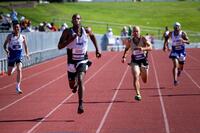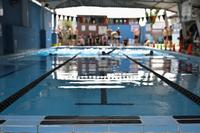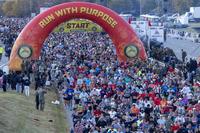Editor's Note: This story has been updated to remove information regarding cadence push-ups; officials have said a decision has not been made to add them to the 2020 PFA. The story has also been updated to clarify that a timeline and specifics have not been released for swapping crunches with planks on the test. More information about ongoing testing can be found here.
Sometime in 2020, the Navy plans to make changes in its physical fitness assessment (PFA).
Sailors no longer will do crunches for two minutes; crunches will be replaced by plank pose. Also, a bike or rowing test can replace the running test. Navy officials have not said exactly when the change is set to take place; a study that will help inform new scoring rules is expected to wrap up in April 2020.
More details on the standards for passing and maxing these new changes will be updated later with new charts.
The New Navy Physical Fitness Assessment 2020
Changes are coming, but you cannot think that they will make this test easier. Quite the contrary: Differences in the way you perform an exercise can make it more challenging than before. Fail to practice the changes below, and you may fail your first PFA -- even if you could pass the other test easily.
This Test Is Actually Harder
First of all, back-to-back plank pose and push-ups exercises are tough. One of the reasons why people cannot do push-ups well is a lack of core strength and an inability to keep their back straight during the full two minutes of the push-up test. Add in a few minutes of plank pose right before you do the push-ups, and you have a recipe for a test that's much harder on your core and upper-body muscle stamina.
The Specific Changes
Crunches are out. Plank pose is in.
The two-minute crunch test has long been blamed for lower-back issues. Let's see how holding a plank pose for 2-4 minutes challenges you. As with anything, you need to practice planking. The good news is that you can drop down and practice a plank pose just about anywhere.
Many people who can do well on the crunch test actually lack the core stability and core (lower back/upper back/abdominal) muscle strength to hold a plank for longer than 20-30 seconds. The plank pose has to be steady, with no wiggling or movement of arms or feet off the floor.
Get good at just being still in the plank. You may want to sing a song in your head or go to your happy place to help pass the time. A good performance on this test likely will require 2-4 minutes of flawless planking. To max the Marine Corps plank option, you have to do it for four minutes.
These Changes Are Nothing New
The plank pose is old school. This exercise is nothing new. If you are involved in a yoga course, you likely will do really well on the plank pose. But you should practice the plank and be able to get into the position anytime you want. It can be between sets of your normal workout. Maybe even make it a rest set between running or other cardio intervals.
The goal here is to practice planks. Other exercises that will help you are the deadlift, Romanian deadlift, push-ups, leaning rest, hanging knee-ups and TRX plank poses with either feet or forearms in the straps. These will help you build a strong core to remain in the plank pose longer, but you have to practice them consistently as part of your training.
This article is more about the changes to the test and how to get better at skills the changes require and less about the pass/fail standards of the new events. They will be added when the standards are approved. Let this be a warning: These options are not easier than push-ups or crunches. They are challenging and different, so you have to start training and preparing differently for them.
Related articles:
Plank, Crawls, and Core Strengthening. With push-ups and planks back to back, you need more core work.
Plank Pose Video. During practice, mix side planks into your workout, but for the test, you cannot do anything but the regular plank pose and not move.
PT Reset. Some good exercises to help with core strength and push-up balance.
Stew Smith is a former Navy SEAL and fitness author certified as a Strength and Conditioning Specialist (CSCS) with the National Strength and Conditioning Association. Visit his Fitness eBook store if you’re looking to start a workout program to create a healthy lifestyle. Send your fitness questions to stew@stewsmith.com.
Want to Learn More About Military Life?
Whether you're thinking of joining the military, looking for fitness and basic training tips, or keeping up with military life and benefits, Military.com has you covered. Subscribe to Military.com to have military news, updates and resources delivered directly to your inbox.



















